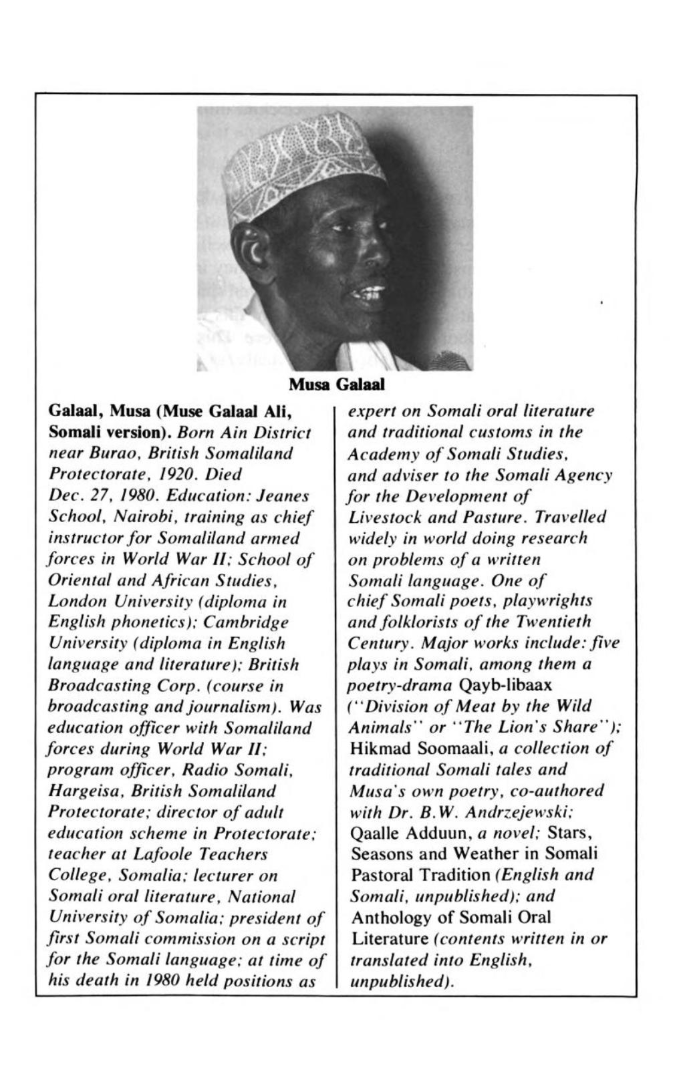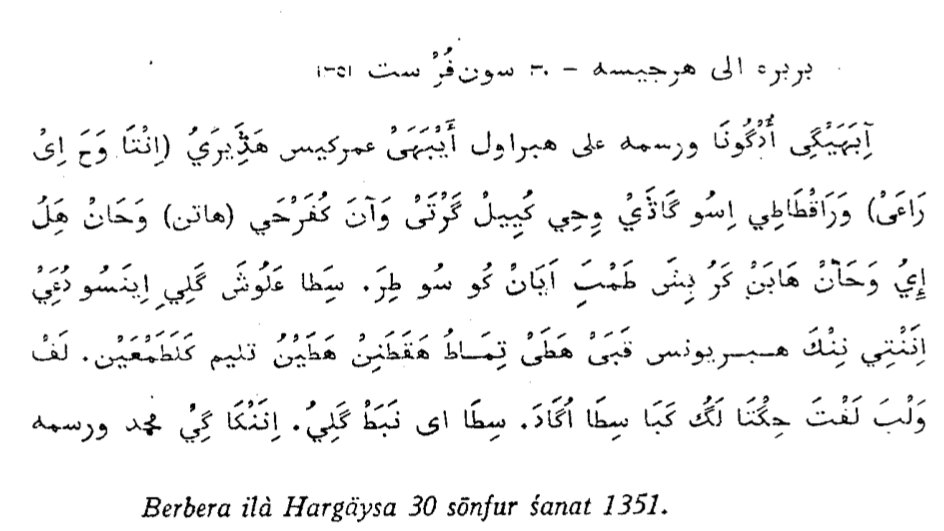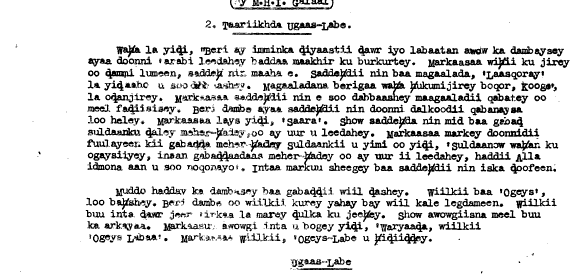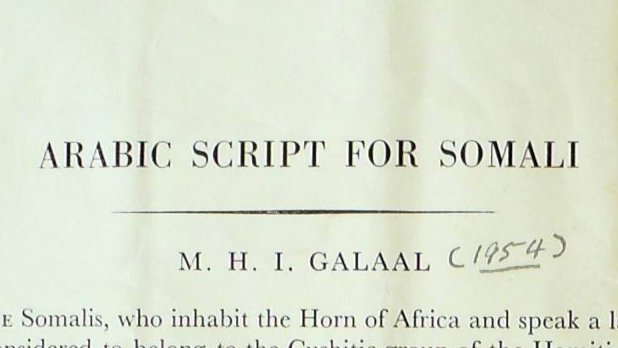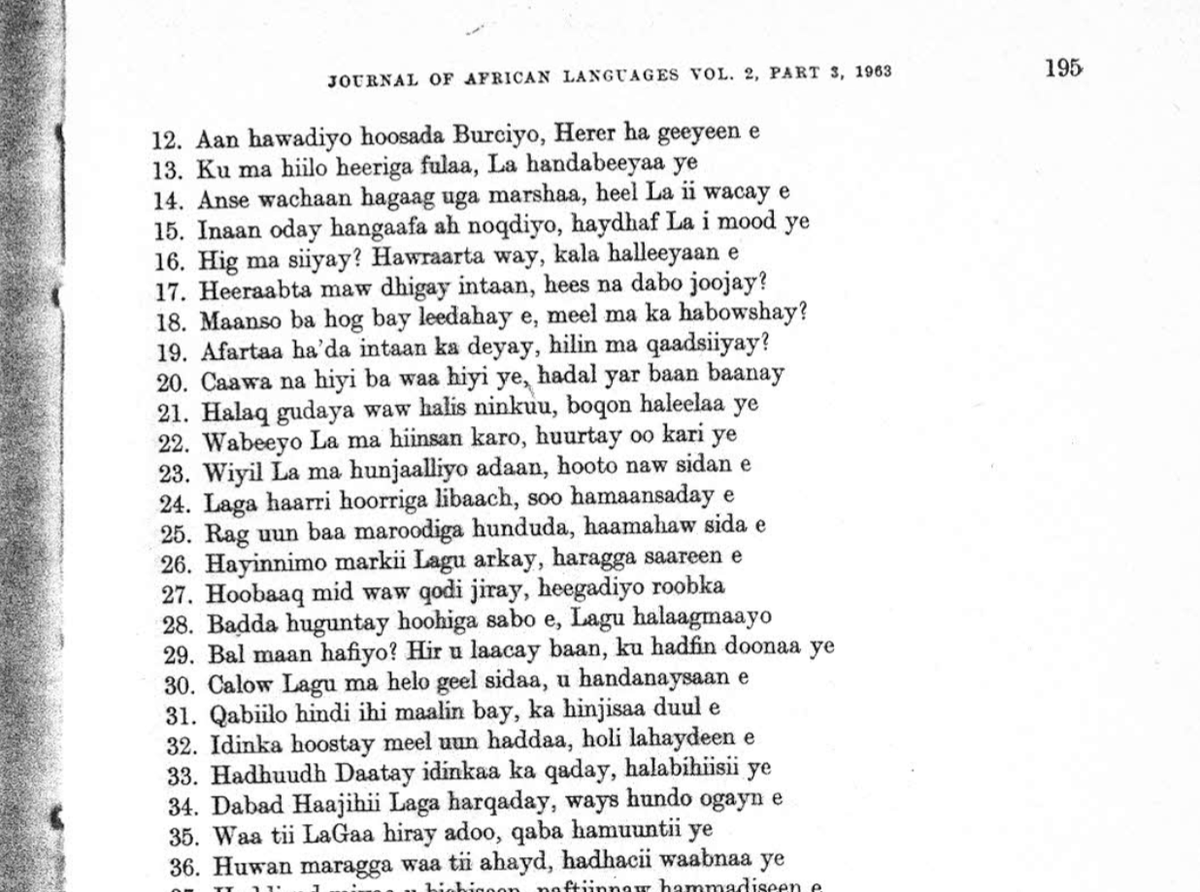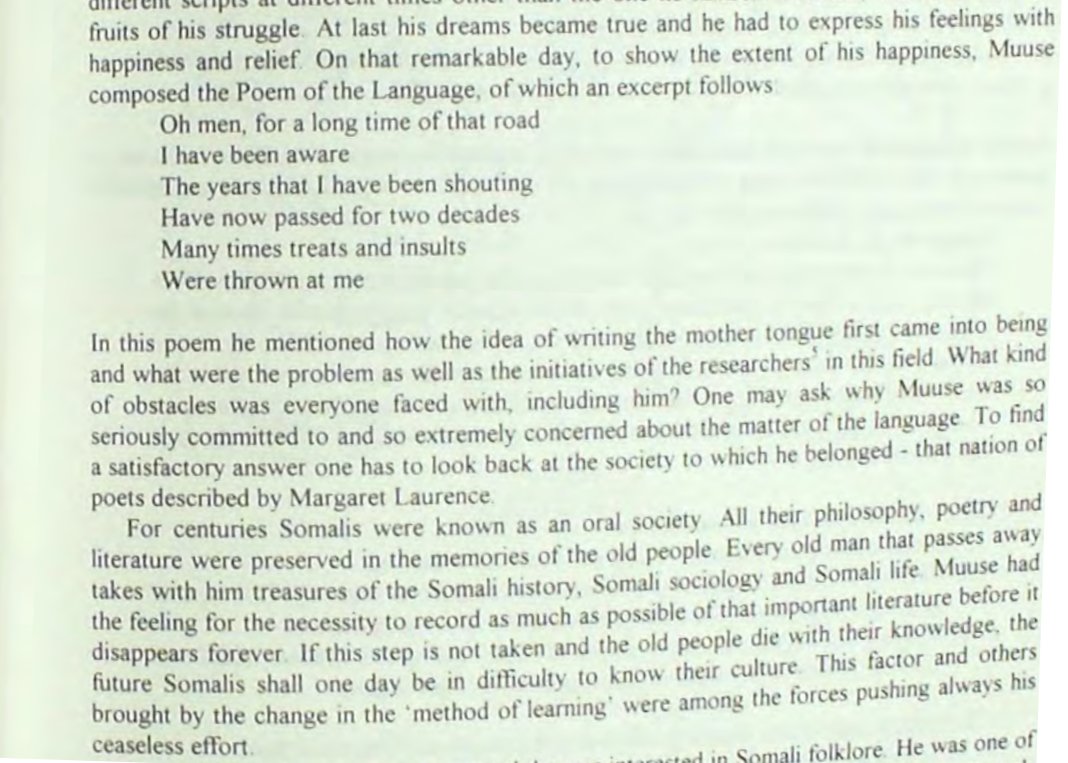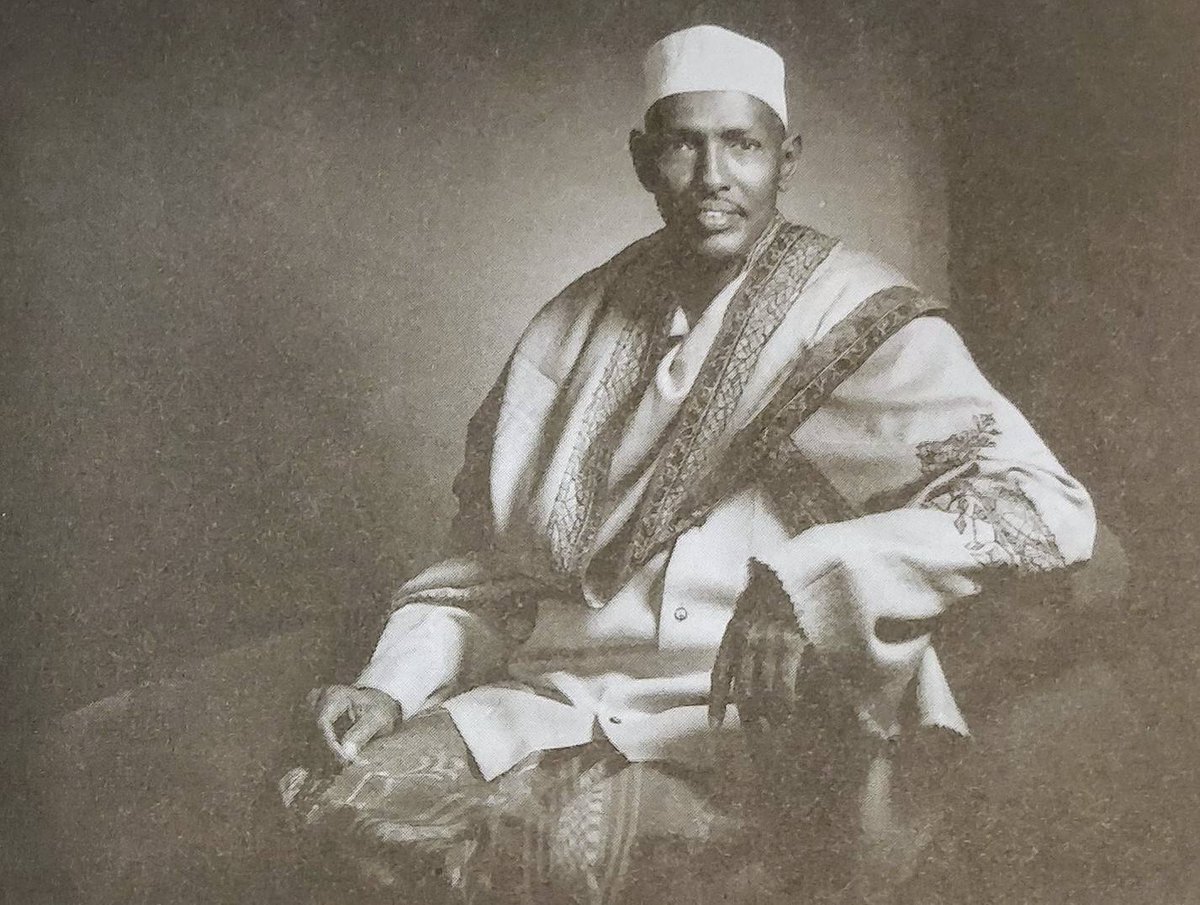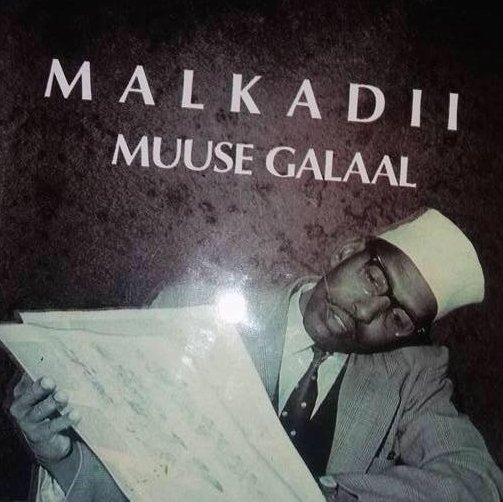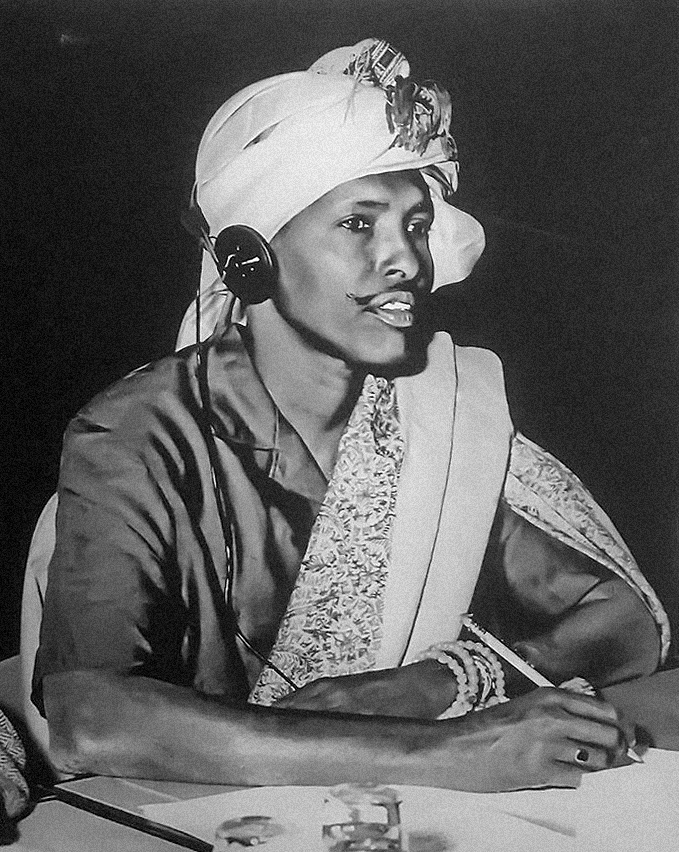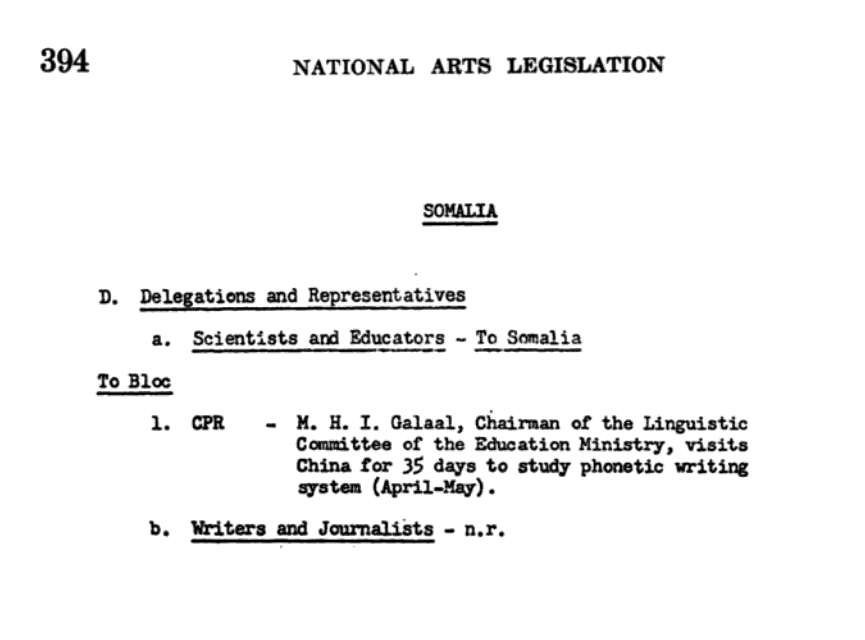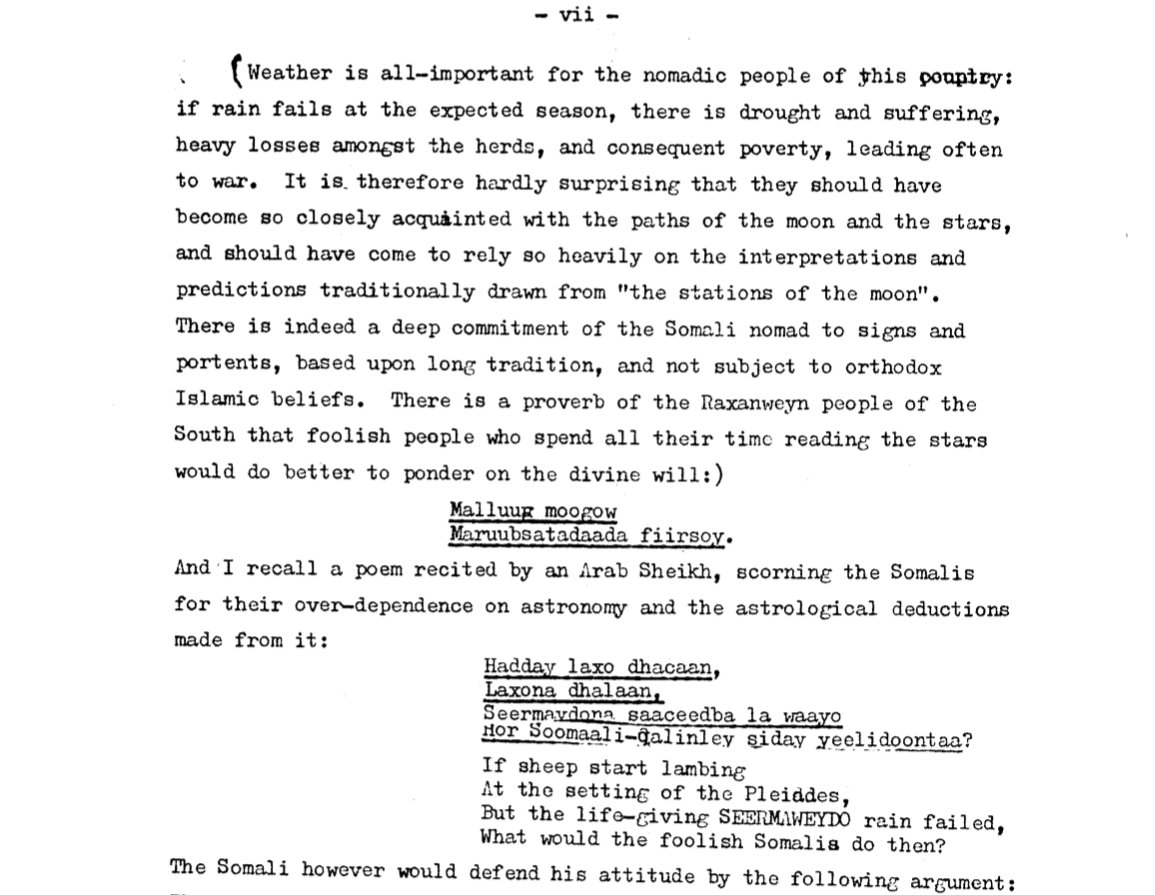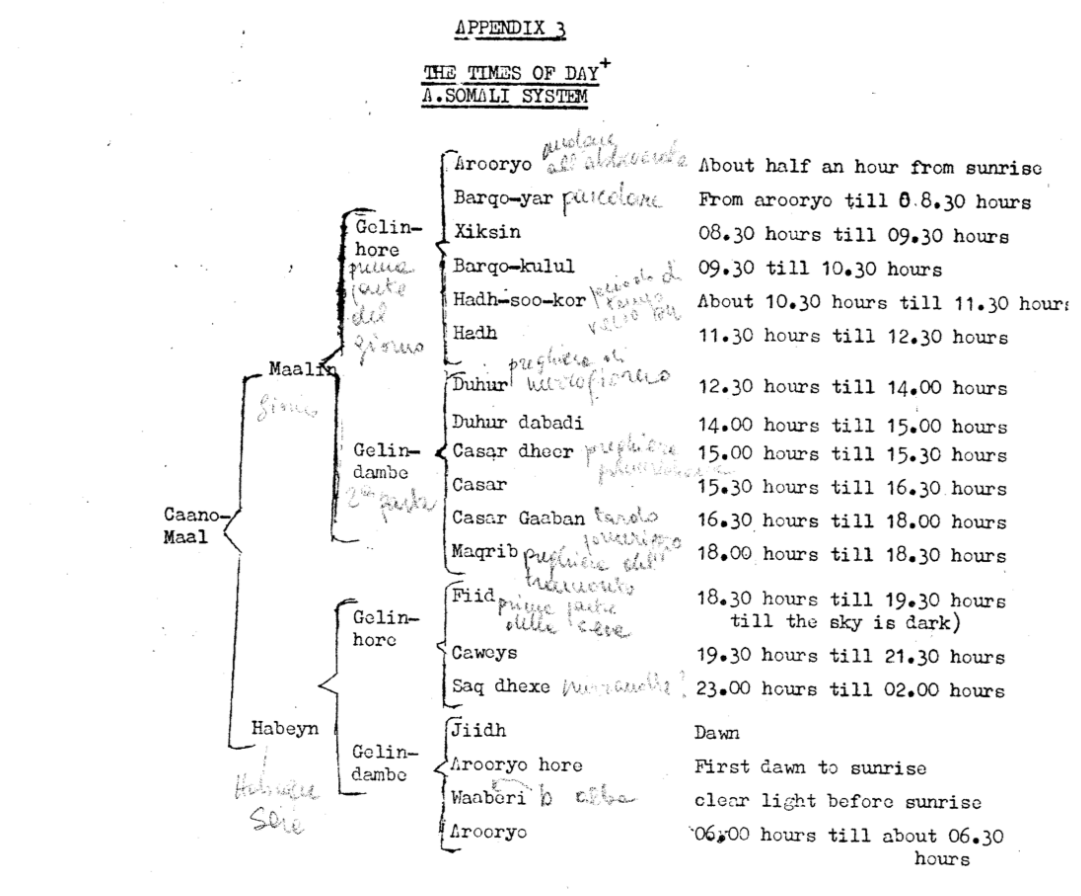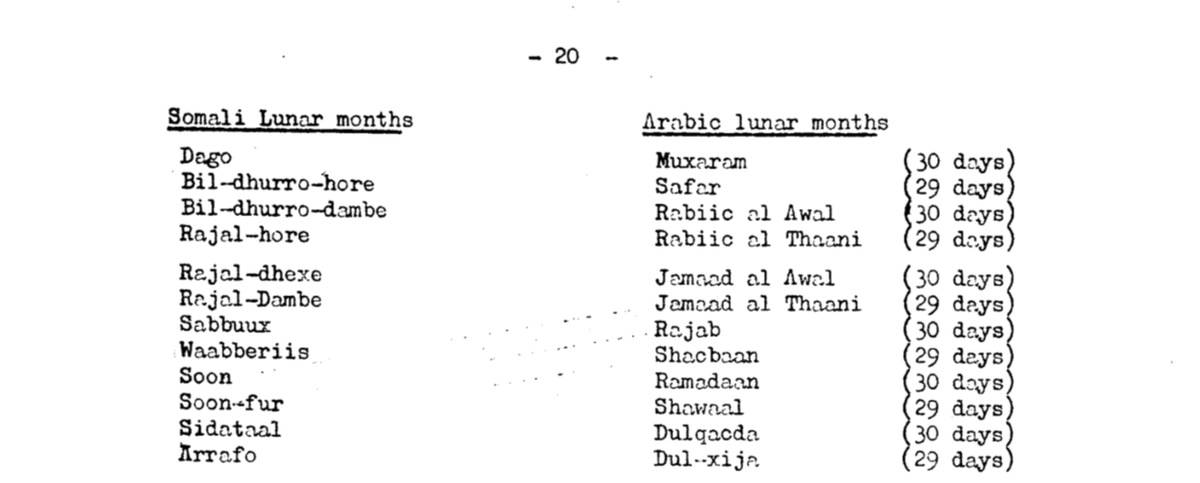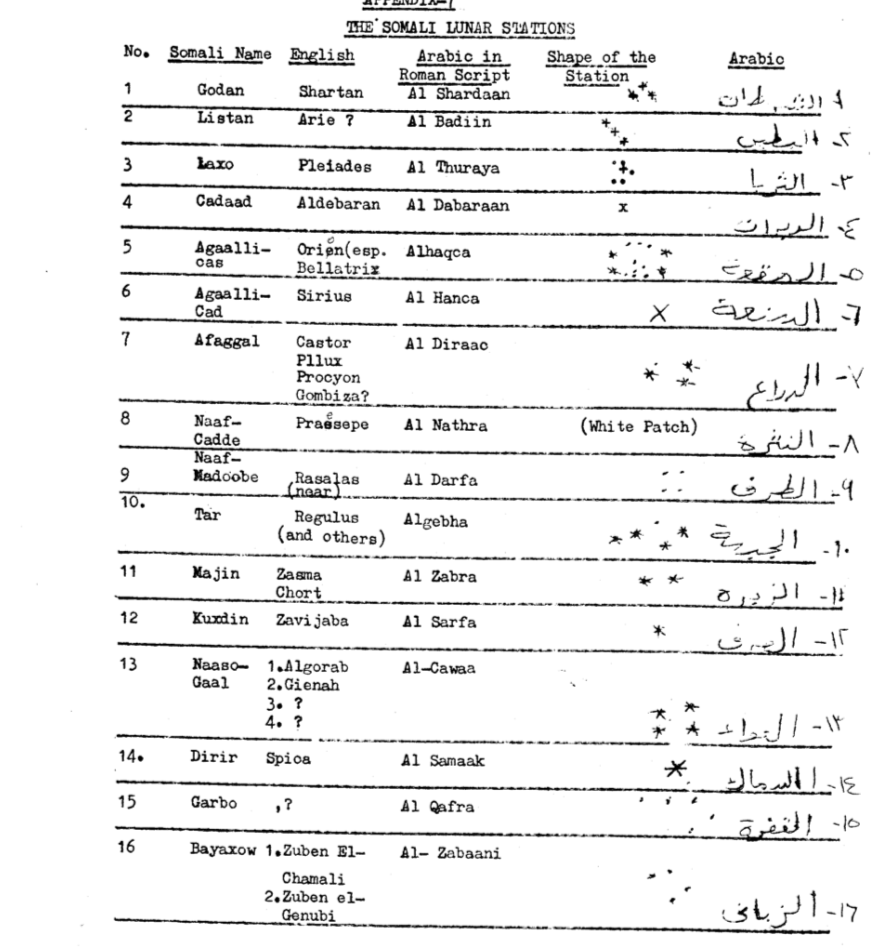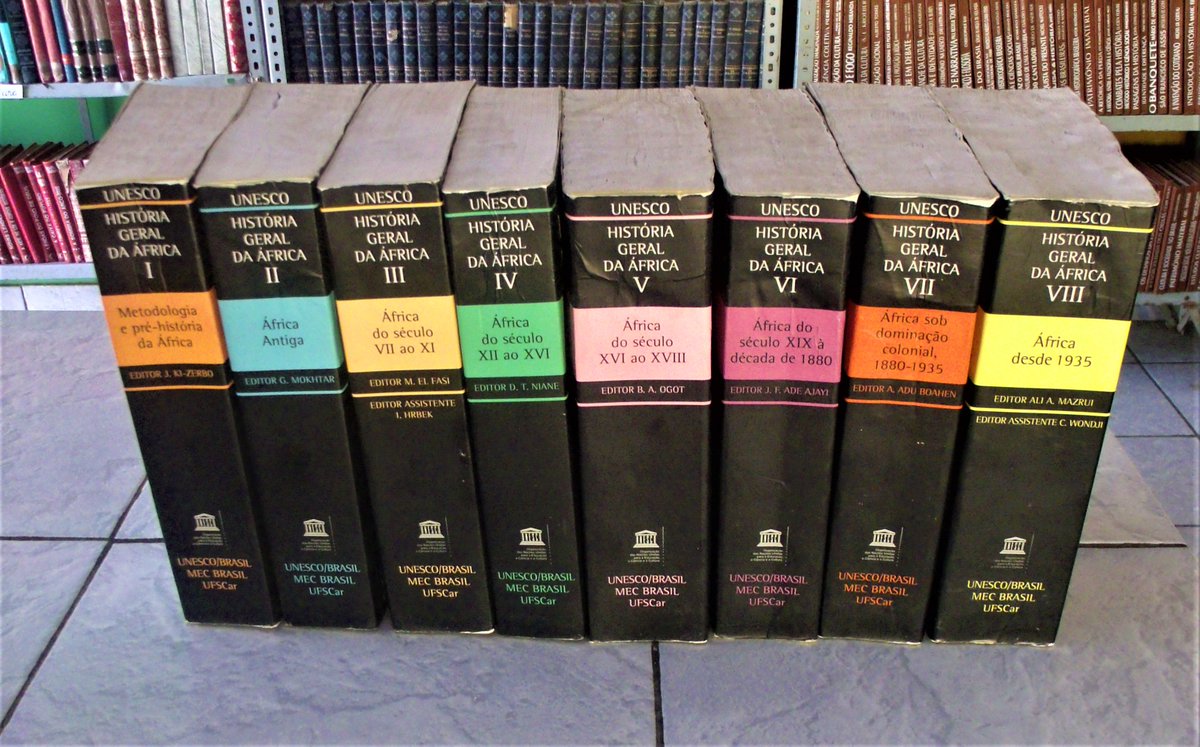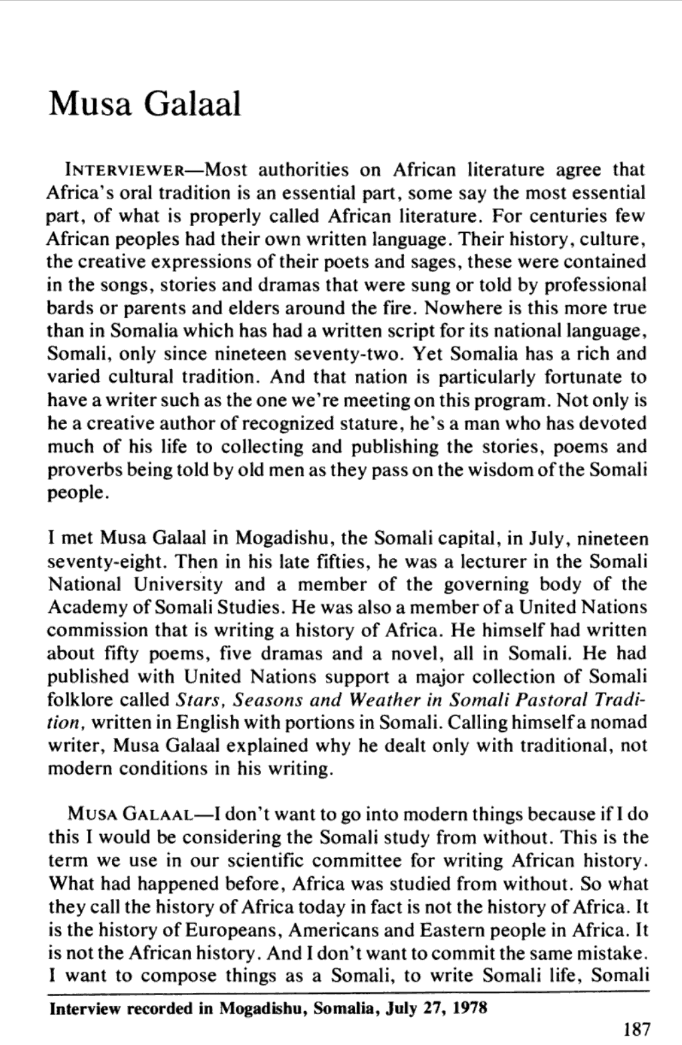27 Dec.
Today marks the 40th anniversary of the passing of the creator of the Latin Somali Alphabet, Muse Haji Ismail Galal.
A thread on his extraordinary life, from a nomad in Cayn, to visiting China in search for suitable alphabet for the Somali language.
#Somaliland #Somalia
Today marks the 40th anniversary of the passing of the creator of the Latin Somali Alphabet, Muse Haji Ismail Galal.
A thread on his extraordinary life, from a nomad in Cayn, to visiting China in search for suitable alphabet for the Somali language.
#Somaliland #Somalia
Muse Galaal was born circa 1920 in Cayn, #Somaliland to a nomadic family. He was a writer, poet, scholar, linguist, historian and polymath.
He was an expert in traditional Somali science with keen interest in Somali astrological, meteorological and calendrical systems.
#Somalia
He was an expert in traditional Somali science with keen interest in Somali astrological, meteorological and calendrical systems.
#Somalia
Galaal was one of the first Somalis to attend both School of Oriental and African Studies, where he studied English phonetics, as well as Cambridge University where he studied English Language and Literature.
He has one of the most impressive CVs you will see
He has one of the most impressive CVs you will see

In addition to inventing both the Arabic and Latin Somali alphabets (more on that below), Muse Galaal's life's work was collection and preservation of Somali culture.
He wrote radio programs promoting Somali culture for BBC, German SFB, Radio Cairo, Radio Peking + many others
He wrote radio programs promoting Somali culture for BBC, German SFB, Radio Cairo, Radio Peking + many others

To understand Muse Galaal's monumental impact on Somali culture, one has to first know that the Somali language before his time was mostly an oral language, i.e. without a proper script.
Only few learned individuals used writing systems, many did their correspondence in Arabic.
Only few learned individuals used writing systems, many did their correspondence in Arabic.
In the 40s & 50s, there was a fierce debate in #Somaliland about the creation of a Somali script.
On one side Muse Galaal, argued its a MUST to create a script for the Somali language.
Many Somali intellectuals at the time believed Somali must be discarded, and Arabic used.
On one side Muse Galaal, argued its a MUST to create a script for the Somali language.
Many Somali intellectuals at the time believed Somali must be discarded, and Arabic used.
In this impassioned letter, published by Somaliland Protectorate press, Muse Galaal fiercely rebukes Ali Garad Jama (later 1st SL Minister of Communication) who wanted all Somalis to learn Arabic!
"Arabic has a place in Somaliland as a language, and that is 'second place'."
"Arabic has a place in Somaliland as a language, and that is 'second place'."

In 1953, Muse Galaal published a short story in Somaliland Protectorate press. The story was published using the Latin alphabet he devised in the early 50s.
Here, Galal introduces the double vowel system, an important feature in the Somali script used today.
Can you read it?
Here, Galal introduces the double vowel system, an important feature in the Somali script used today.
Can you read it?

Galaal was attacked for developing a Latin script for the Somali language. His research was labeled "a foreign plot against Islam" by locals in Hargeisa.
He received the same negative response when he travelled to Mogadishu in 1951, as the SYL supported use of Arabic officially.
He received the same negative response when he travelled to Mogadishu in 1951, as the SYL supported use of Arabic officially.
In 1951 when he was doing his research at the London School of Oriental and African Studies, the Somali community in Britain learned of his development of a Latin script, and he was attacked again.
Which is why in 1954 he decided to retry the Arabic script with modification.
Which is why in 1954 he decided to retry the Arabic script with modification.
Galaal financed the project from his own resources. He invented new signs for the missing letters and soldered it on an Arabic typewriter, thus creating the very first Arabic typewriter for the Somali language!
To his surprise and dismay, this one too was met with more opposition, on the grounds that Somali written in Arabic will distort the teachings of the Quran! 

In 1956, Muse Galaal published a new book, Hikmad Soomaali, in which a new version of his Latin script was published.
This is a refined version of his earlier script, but notice how the current "C" and "Dh" are yet to be added.
Try to read it this short story
This is a refined version of his earlier script, but notice how the current "C" and "Dh" are yet to be added.
Try to read it this short story

Galaal went on to further develop his script in collaboration with his long term research partner B. W. Andrzejewski, culminating in the 1963 publication of A Somali Poetic Combat.
The most significant change here is the introduction of "Dh" and "C" letters.
The most significant change here is the introduction of "Dh" and "C" letters.
In 1972 the Latin script was officially announced as the national script for the Somali Republic.
In celebration, Muse Galaal composed the Poem of the Language, retelling his long and hard road to this monumental achievement.
In celebration, Muse Galaal composed the Poem of the Language, retelling his long and hard road to this monumental achievement.
Leading Somali intellectuals today fondly remember Muse Galaal teaching them the script and telling them "this is your alphabet".. as he placed a huge stick on his desk in anticipation of questions 

Prof. B. W. Andrzejewski describes the Somali script as Galaal's "gift" to Somalis:
"even now, when the Somali state has disintegrated, the official orthography serves Somalis all over the world. To them, Musa Galaal's gift is like a well whose waters never get exhausted."
"even now, when the Somali state has disintegrated, the official orthography serves Somalis all over the world. To them, Musa Galaal's gift is like a well whose waters never get exhausted."
As promised, day 2 of #GalaalWeek:
Muse Galaal toured the world in search of the best writing system for Somalis.
One of the major stops was China. He was invited by Kuo Mo-jo, one of the major cultural figures of modern China, dubbed Eastern Goethe. Galaal stayed for 35 days.
Muse Galaal toured the world in search of the best writing system for Somalis.
One of the major stops was China. He was invited by Kuo Mo-jo, one of the major cultural figures of modern China, dubbed Eastern Goethe. Galaal stayed for 35 days.
Muse Galaal was very impressed by how China was creating efficient systems of writing for minority languages.
The visit was highly publicised in the Jen min jih pao (People's daily). Galaal delivered a series of public lectures on linguistics.
#GalaalWeek #Somaliland #Somalia
The visit was highly publicised in the Jen min jih pao (People's daily). Galaal delivered a series of public lectures on linguistics.
#GalaalWeek #Somaliland #Somalia
A great photograph of Muse Galaal's meeting with Kuo Mo-jo in China courtesy of @alibrahimo.
#GalaalWeek #Somaliland #Somalia https://twitter.com/alibrahimo/status/1343640521047158789
#GalaalWeek #Somaliland #Somalia https://twitter.com/alibrahimo/status/1343640521047158789
Part 2 of the BBC radio program written by Muse Galaal to introduce international audience to Somali poetry.
Here Galaal recites examples of the Somali Geeraar, a form of poetry often used in war with a rhythm resembling the galloping of horses!
#GalaalWeek #Somaliland #Somalia
Here Galaal recites examples of the Somali Geeraar, a form of poetry often used in war with a rhythm resembling the galloping of horses!
#GalaalWeek #Somaliland #Somalia
Here, Galaal is reciting examples of Hees. A vigorous form of Somali poetry recited when dancing, watering the herds, or searching for new pasture.
Then, the Wiglo, recited by those on guard duties to stay awake all night!
#GalaalWeek #Somaliland #Somalia
Then, the Wiglo, recited by those on guard duties to stay awake all night!
#GalaalWeek #Somaliland #Somalia
As an example of marching or rallying poetry, Galaal recites Dhaanto to BBC listeners.
#GalaalWeek #Somaliland #Somalia
#GalaalWeek #Somaliland #Somalia
Muse Galaal was the foremost expert on traditional Somali science and medicine.
His magnum opus The Terminology and Practice of Somali Weather Lore, Astronomy and Astrology, is the greatest book on traditional Somali science.
#GalaalWeek #Somaliland #Somalia
His magnum opus The Terminology and Practice of Somali Weather Lore, Astronomy and Astrology, is the greatest book on traditional Somali science.
#GalaalWeek #Somaliland #Somalia
The book is a deep dive in traditional Somali understanding of weather, astronomy and astrology. Written from the point of view of someone who spent the first 20 years of his life as a nomad in the interior.
Only someone with Galal's unique history could've written such a book.
Only someone with Galal's unique history could've written such a book.
The alphabet used in this book is the final version of the Somali alphabet we use today. It is worth noting that the book was written in the mid 60s, the alphabet was still not accepted officially.
Try to read the poetic verses included
Download link:
https://arcadia.sba.uniroma3.it/bitstream/2307/737/1/Stars%2C%20seasons%20and%20weather%20in%20somali%20pastoral%20traditions.pdf
Try to read the poetic verses included

Download link:
https://arcadia.sba.uniroma3.it/bitstream/2307/737/1/Stars%2C%20seasons%20and%20weather%20in%20somali%20pastoral%20traditions.pdf
#GalaalWeek continues 
A photograph of Muse Haji Ismail Galaal and his long term friend and research partner B. W. Andrzejewski in 1951, as part of the first ever Somali language committee.
#Somaliland #Somalia

A photograph of Muse Haji Ismail Galaal and his long term friend and research partner B. W. Andrzejewski in 1951, as part of the first ever Somali language committee.
#Somaliland #Somalia
Another dimension of Muse Galaal's work, is his contribution to the documentation of African history.
Galaal was a founding member of UNESCO's International Scientific Committee for the Drafting of a General History of Africa.
#Somaliland #Somalia
Galaal was a founding member of UNESCO's International Scientific Committee for the Drafting of a General History of Africa.
#Somaliland #Somalia
The aim of this group was for newly independent African states to reclaim their cultural identity, rectify widespread ignorance about Africans and share their heritage with the world.
Galaal and his colleagues produced eight volumes detailing the rich history of Africa.
Galaal and his colleagues produced eight volumes detailing the rich history of Africa.
The tree of Somali culture, hand drawn by Muuse Xaaji Ismaaciil Galaal is a wonderful encapsulation of Somali Dhaqan.
#GalaalWeek #Somaliland #Somalia #Djibouti
#GalaalWeek #Somaliland #Somalia #Djibouti
Last day of #GalaalWeek!
Galaal is one of the few Somalis included in the Oxford Uni Press Dictionary of African Biography which recognises those who shaped Africa’s history.
Among many things, it highlights Galaal's leading role in creation of Somali Studies Int. Association.
Galaal is one of the few Somalis included in the Oxford Uni Press Dictionary of African Biography which recognises those who shaped Africa’s history.
Among many things, it highlights Galaal's leading role in creation of Somali Studies Int. Association.

 Read on Twitter
Read on Twitter

